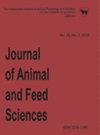不同水平小黑麦替代玉米对蛋鸡生产性能、蛋品质、蛋黄脂肪酸谱和血液参数的影响
IF 1.5
4区 农林科学
Q3 AGRICULTURE, DAIRY & ANIMAL SCIENCE
引用次数: 3
摘要
玉米被认为是畜牧业最有效的能源之一,尤其是在家禽业。然而,由于其对人类和牲畜的喂养需求,其价格不断上涨(Bakhtiyary Moez et al.,2020),导致许多研究人员研究了使用生产成本较低并确保良好鸟类性能的替代成分。小黑麦是一种由小麦和黑麦杂交而成的人造作物,与玉米或小麦相比,其价格低廉,耐干旱。这种谷物还含有良好的蛋白质水平,这可能使它在家禽营养中完全取代玉米。Cornejo等人(1973)得出结论,含有15.3%粗蛋白的小黑麦样品相当于小麦和玉米,优于大麦。如果在当地生产,与进口谷物相比,小黑麦在动物饮食中可能更便宜、更环保。此外,先前的实验表明,在肉鸡(Rao等人,1976;Reddy等人,1979)和蛋鸡(Shafey等人,1992;Franco等人,2020)的日粮中,小黑麦是玉米的良好替代品。摘要。本研究旨在研究用0、50、100、150和200 g/kg小黑麦代替日粮玉米对蛋鸡生产性能、鸡蛋品质、蛋黄脂肪酸和血液变量的影响。将五种实验日粮混合为等能和等氮日粮,并在22至28周龄的蛋鸡中饲养六周。在一个环境控制的实验室中,360只22周大的Hy-Line Brown蛋鸡被单独称重,并被随机分配到60个富集的笼子里,每个笼子里有6只鸡。笼子里有一个产卵窝、抓挠区、前面的金属喂食器和里面的两个乳头饮水器。随机分组后,将每种饲料喂入12个笼子。在整个实验过程中,饲料和水可以随意获得。生产变量不受含有不同水平小黑麦的日粮的影响。在鸡蛋品质性状中,添加小黑麦后,蛋黄颜色呈线性下降(P<0.001)。日粮小黑麦对蛋黄脂肪酸组成没有影响(P>0.05)。除了葡萄糖水平在日粮中随小黑麦呈线性增加(P<0.001)外,其余研究的血液变量对日粮小小麦的变化没有反应(P>0.05)。已经得出的结论是,在蛋鸡日粮中用小黑麦代替玉米20%对鸡蛋生产变量和/或生产效率没有任何不利影响。接收日期:2021年9月3日修订日期:2021 2021年11月30日接受时间:2021年12月14日本文章由计算机程序翻译,如有差异,请以英文原文为准。
Effect of maize replacement with different triticale levels on layers production performance, egg quality, yolk fatty acid profile and blood parameters
Maize is recognised as one of the most efficient energy sources for livestock, particularly within the poultry industry. However, its constantly increasing price due to its demand for feeding both humans and livestock (Bakhtiyary Moez et al., 2020) has led a number of researchers to investigate the use of alternative ingredients with lower production costs and assuring good bird performance. Triticale, a human-made crop resulting from the crossing between wheat and rye, distinguished itself with a low price and a resistance to dry weather compared to maize or wheat. This grain contains also a good protein level that might allow it to fairly replace maize in poultry nutrition. Cornejo et al. (1973) concluded that the triticale sample containing 15.3% crude protein was equivalent to wheat and maize and superior to barley. If locally produced, triticale may be less expensive and more environmentally friendly cereal to use in animal diets compared to imported cereals. Also, previous experiments indicate that triticale is a good substitute for maize in the diets of broilers (Rao et al., 1976; Reddy et al., 1979) and laying hens (Shafey et al., 1992; Franco et al., 2020). ABSTRACT. The study aims to investigate the effect of replacing dietary maize with 0, 50, 100, 150 and 200 g/kg of triticale on production performance, egg quality, yolk fatty acids, and blood variables when fed to laying hens. Five experimental diets were mixed to be isoenergetic and isonitrogenous and were fed to the layers for six weeks, from 22 to 28 week of age. Three hundred and sixty 22-week-old Hy-Line Brown laying hens were individually weighed and randomly allocated to 60 enriched cages giving six birds per cage, in an environmentally controlled experimental house. The cages were equipped with a laying nest, scratching area, metal feeders in front and two nipple drinkers inside. Each diet was fed to 12 cages following randomisation. Feed and water were available ad libitum throughout the experiment. Production variables remained unaffected by the diets containing triticale at various levels. Among the egg quality traits, egg yolk colour linearly decreased (P < 0.001) by dietary triticale inclusion. Dietary triticale did not have an impact on egg yolk fatty acid composition (P > 0.05). Apart from the glucose level, increasing in a linear fashion (P < 0.001) with triticale in diets, the rest of the studied blood variables did not respond (P > 0.05) to changes in dietary triticale. It has been concluded that 20% replacement of maize with triticale in laying hen diets did not have any detrimental impact on egg production variables and or the efficiency of production. Received: 3 September 2021 Revised: 30 November 2021 Accepted: 14 December 2021
求助全文
通过发布文献求助,成功后即可免费获取论文全文。
去求助
来源期刊

Journal of Animal and Feed Sciences
农林科学-奶制品与动物科学
CiteScore
2.10
自引率
0.00%
发文量
42
审稿时长
3 months
期刊介绍:
Journal of Animal and Feed Sciences (JAFS, J. Anim. Feed Sci.) has been published by the Kielanowski Institute of Animal Physiology and Nutrition, Polish Academy of Sciences in Jabłonna (Poland) since 1991. It is a continuation of the Polish-language journal Roczniki Nauk Rolniczych. Seria B, Zootechniczna published by the Polish Academy of Sciences since 1969.
JAFS is an international scientific journal published quarterly, about 40 papers per year including original papers, short communications and occasionally reviews. All papers are peer-reviewed and related to basic and applied researches in the field of animal breeding and genetics, physiology of nutrition, animal feeding, feed technology and food preservation. The journal distinguishes the multidisciplinary nature of physiological and nutritional sciences and so includes papers specialized in all fields connected with animal well-being, including molecular and cell biology and the emerging area of genetics.
 求助内容:
求助内容: 应助结果提醒方式:
应助结果提醒方式:


